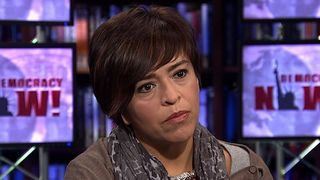
Author and investigative reporter Charles Bowden died Saturday at his home in Arizona at the age of 69. Watch one of our most recent interviews with him in April 2010, when he had just published “Murder City: Ciudad Juárez and the Global Economy’s New Killing Fields.”
See all of Bowden’s interviews on Democracy Now!
Bowden reported extensively for newspapers and magazines, and authored 11 books, many about drug violence in Mexico after the passage of NAFTA. In 1998 he wrote “Juárez: The Laboratory of our Future,” with a preface by Noam Chomsky, an afterword by Eduardo Galeano, and graphic images taken by Mexican photographers.
Many journalists admired Bowden’s prose and dedication to the craft. Cartoonist Max Cannon told The Tucson Sentinel: “He lived on his own terms to the extreme — he was a master wordsmith, a detective, a poet, a scholar, a gentleman rogue, and a fearless traveler into humanity’s darkest places.”
The Arizona Republic noted that Bowden’s work as a reporter followed his first career as a history professor.
[Bowden] left a position teaching history at the University of Chicago, worked in manual labor for some time, and eventually became a reporter for the now-defunct Tucson Citizen. There he spent years reporting on gruesome crimes before he moved on to other investigative journalism, [writer Barry] Graham said.
“He would actually refer to a book or an article as a song,” Graham said. “He taught me to go to some of the ugliest, darkest places in life but not to write a horror story about it. To go where most of us really don’t want to go but, essentially, to sing a song about it. To capture the music of what happened.”












Media Options